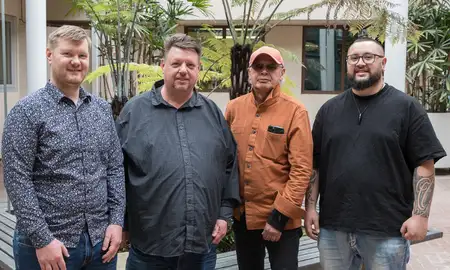
Five projects have received MBIE funding.
The five projects have together received Massey’s highest-ever tally for a Ministry of Business, Innovation and Employment Endeavour funding round. The 2023 round received 442 applications, with 68 being approved for funding.
Provost Professor Giselle Byrnes says the outcomes for Massey researchers are outstanding and are the result of great teamwork in preparing these funding applications.
"These research projects are all strongly aligned with the university’s goal to advance research that matters to the communities we serve, solving contemporary societal challenges and maintaining our commitment to scientific endeavour, fundamental knowledge discovery and scholarship. We are immensely proud of our researchers and their work."
Endeavour funding is available through two mechanisms - Smart Ideas and Research Programmes.
Research Programmes
Modifiable pathways to sustainable ageing in Aotearoa
Led by Professor Fiona Alpass and Brendon Stevenson from Allen and Clarke, this project will pioneer the use of innovative ‘big data’ and modelling techniques in ageing research. The results will highlight preventable factors leading to frailty in older age, with a focus on the Māori, Pacific and Chinese populations that make up Aotearoa New Zealand’s multicultural society, guided by advisory groups for each population cohort as well as a rich and diverse line-up of international advisors. Findings will provide specific targets for changes in social policy and practice to prevent experiences such as loneliness, dementia and falls in the community, and highlight the different life pathways to frailty or thriving.
In addition to informing policy through the extensive involvement of end users, findings will have a global impact by contributing to the World Health Organisation/United Nations Decade of Healthy Aging reports and contribute to international policy that supports older people to thrive.
The project team includes researchers from New Zealand, Australia, Japan, Wales, Canada, England, Scotland, the United States and The Netherlands. It aligns with multiple national and international healthy ageing strategies and involves widespread and critical relationships with numerous policy and implementation organisations. The project was awarded $11,388,834 of funding over five years.
Kai anamata mō Aotearoa – exploring future food system scenarios and impacts
This project, led by the Sustainable Nutrition Initiative® at the Riddet Institute, will look at equitable and resilient food systems that will reduce New Zealand’s vulnerability to changing environmental, economic and social pressures, while enhancing the wellbeing of people and the environment. A computational model of our food system will be developed to help transition our food sector to a carbon-neutral economy, underpinned by field trials and data collection in Te Tauihu.
Understanding the current characteristics of our food system, including new data generation applied to advanced modelling, will enable prediction and assessment of the impacts of future change at a national and regional level and aid food sector industries and enterprises in planning and implementing production transitions.
The programme will inform evidence-based decisions leading to sustainable change to the New Zealand food system that supports a resilient food sector and enhances the wellbeing of New Zealanders and our environment at both national and regional level.
The project will be led by Dr Nick Smith and Professor Warren McNabb and has been awarded $10,108,846 of funding for five years.
Pungapunga Auaha: Co-developing a new low carbon pumice economic sector for Aotearoa New Zealand with tangata whenua
Principal investigator Dr Anke Zernack will lead this project in conjunction with Professor Cassie Kenney and Nicky Smith from Market Economics Ltd. The project, co-developed with Te Pumautanga o Te Arawa, who manage settlement assets on behalf of 11 Te Arawa iwi and hapū, seeks to kickstart a new pumice economy, fulfilling aspirations around intergenerational wellbeing, kaitiakitanga and leadership in a low-carbon future.
The research will determine how new types of concrete can be produced using New Zealand pumice as a cement replacement. This is globally important, given that cement is a major source of carbon emissions and concrete consumption is increasing. The project will also ascertain the extent to which New Zealand pumice exhibits properties needed for other new and exciting applications such as architectural paints and filtration. By matching knowledge of required properties with their availability, and applying a range of geological and analytical techniques, a detailed inventory and characterisation of the resource will be established.
The project has been co-developed with iwi and involves Māori researchers, several of whom whakapapa to Te Arawa waka. To ensure that the future pumice economy is developed appropriately, balances risks and can meet iwi landowner/investor aspirations, the project will interweave Mātauranga Māori with state-of-the-art tools and approaches from other research disciplines.
The project has been awarded $7,997,290 over five years.
Smart Ideas
Controlling microalgal polyphosphate synthesis to develop technologies for phosphorus upcycling from wastewater
The mining of phosphorus to produce fertiliser depletes geostrategic reserves and costs billions to the economies relying on its import for agriculture. Phosphorus must continuously be added to soils as it is lost via leaching and in the food chain. When phosphorus discharges to aquatic environments, it can causes excess microalgae growth. This project proposes an innovative and environmentally-friendly solution by using the same microalgae that causes eutrophication to recover and recycle phosphorus as high-value polyphosphates.
Science Leader Dr Maxence Plouviez and his team recently achieved considerable advances in understanding which genes are involved in polyphosphate synthesis in microalgae. This project will investigate the polyphosphate-related enzymes and their structural differences in microalgae specialised for different ecological niches. The team will incorporate this new knowledge into innovative technologies that recover phosphorus from aquatic ecosystems, testing them under real-world conditions at the NIWA microalgae-based wastewater treatment facility.
The project has been awarded $999,999 in funding over three years.
Matatuhi: Unlocking the forecasting potential of environmental tohu via ensemble systems models
Our world is changing faster and in ever more diverse ways. Global records are being broken from droughts to floods, and in New Zealand we have seen cataclysmic flooding, volcanic eruptions and the Canterbury earthquakes. An essential task in managing and adapting to our future is being able to forecast it. Science is trying to keep up with these changes, but current forecasting models require large amounts of information and tend to focus only on one small part of a system. Environmental forecasts lack both sufficient data and knowledge to build reliable models.
Led by Dr Melody Whitehead, this project seeks an all-inclusive approach, looking at the system as a whole, with parts intricately woven together. Such an approach is intrinsic to Mātauranga Māori, which provides an alternative lens on what can be considered data, beyond instrumental readings.
The project will provide robust forecasts of the future by combining adaptable statistical tools with the intrinsic mātauranga of iwi. The project will start with the Central Volcanic Plateau region and build location-specific tools that will be realised with iwi that whakapapa to this region. Once proven, the methodologies can be transplanted to other localities around the country.
This research will build robust forecasts of our environmental future, and shift the conversation in New Zealand away from “How can Mātauranga Māori be fitted into science?” and towards “What can science do to support Mātauranga Māori?”
This project has been awarded $999,909 in funding over three years.
Further information about the successful projects can be found here.
Related news
Massey researchers awarded funding for impactful projects
In what is Massey's largest ever cohort, five research projects have been awarded Smart Ideas funding by the Ministry of Business, Innovation and Employment (MBIE).

MBIE funding awarded to researchers for innovative, cutting-edge projects
Four projects led by Massey University researchers have been awarded more than $12 million in the Ministry of Business, Innovation and Employment's (MBIE) 2021 Endeavour Fund.

New research funding will help to address future needs of New Zealand
Massey researchers are the recipients of MBIE funding worth more than $15.4 million.
